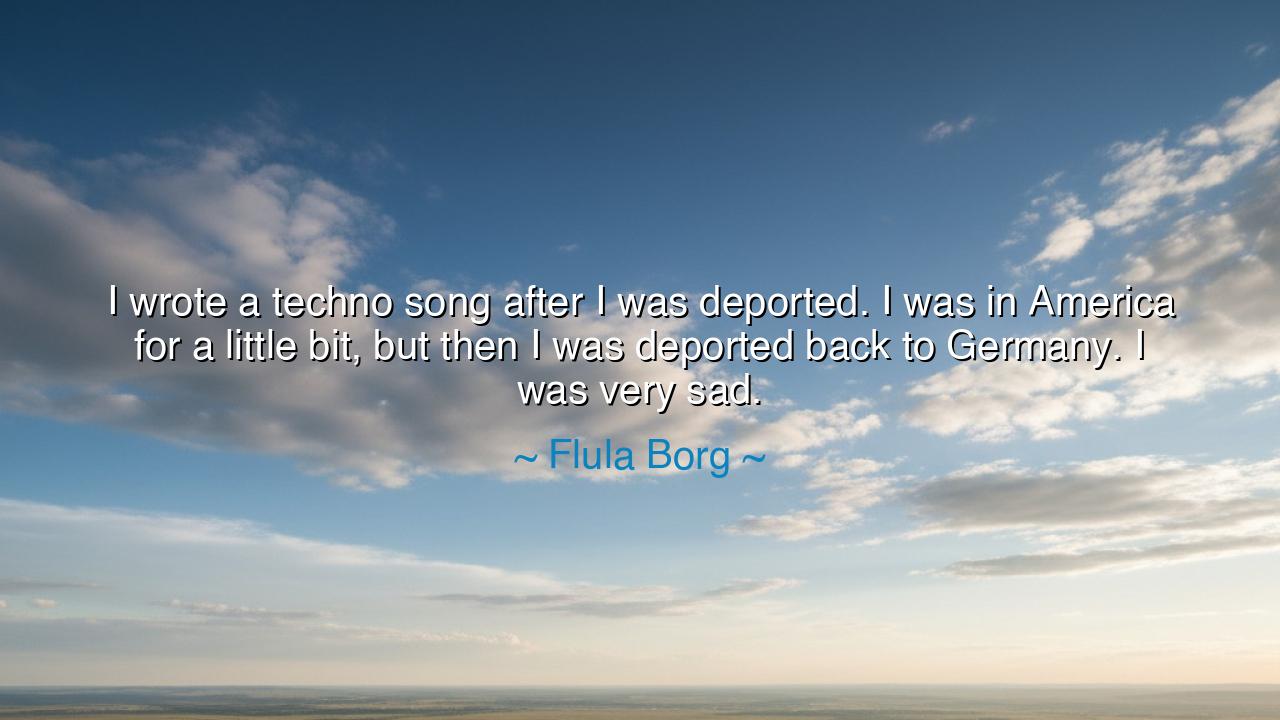
I wrote a techno song after I was deported. I was in America for
I wrote a techno song after I was deported. I was in America for a little bit, but then I was deported back to Germany. I was very sad.






Hear, O seekers of art and resilience, the words of Flula Borg, the German musician, comedian, and wanderer between worlds: “I wrote a techno song after I was deported. I was in America for a little bit, but then I was deported back to Germany. I was very sad.” Within this confession lies not a tale of defeat, but a meditation on the alchemy of sorrow—how the artist transforms pain into rhythm, and exile into creation. It is the timeless story of those who lose a homeland only to find a deeper voice within themselves.
The origin of this quote reaches back to Borg’s early years, when he pursued his dreams in America, a land that represented opportunity, adventure, and creative freedom. Yet his time there was cut short when bureaucracy and borders reminded him that even dreams must bow to law. The deportation was not merely a physical return to Germany—it was an emotional fall, a forced separation from a world that had inspired him. In that sadness, he did what true artists have done through the ages: he transmuted grief into sound. The techno song he wrote became his act of healing, a pulse of electronic rhythm born from the heartbeat of exile.
His lament recalls the age-old truth that art is the language of the displaced. From the ancient poets banished from their cities to the wandering troubadours of medieval Europe, creation has long been the way by which the exiled reclaim their voice. Consider Victor Hugo, who, banished from France for his defiance, wrote Les Misérables while living far from his homeland. In his suffering, he created one of the world’s great works of compassion. So too did Flula Borg, in his own way, transform personal loss into music that speaks beyond words—an echo of how even the modern artist must face exile and turn it into expression.
When Borg says, “I was very sad,” his simplicity is disarming. It strips away the glamour of fame and the illusions of strength, revealing the universal humanity of sorrow. His sadness is not melodrama—it is the quiet ache of one who has lost place and purpose, yet refuses to be silenced. In ancient wisdom, the sage would say: grief, when accepted, becomes the root of wisdom; when denied, it becomes the seed of bitterness. Borg’s creation of music from his sadness shows that healing does not come from forgetting, but from transforming what was painful into something that can move others to understanding.
There is also a deeper spiritual resonance in his words. Deportation—forced return—is not only a legal act; it is a metaphor for life’s sudden reversals. Each person, at some point, is deported from the comfort of their illusions, sent back to face themselves, to rediscover meaning in what feels like exile. Borg’s act of writing a song reminds us that redemption begins not with the return of fortune, but with the choice to create despite despair. His story is a parable of resilience: the soul’s refusal to be caged by circumstance.
History tells us that many who have been displaced have carried forward civilization’s most powerful gifts. The philosopher Boethius, imprisoned and awaiting death in the sixth century, wrote The Consolation of Philosophy, a dialogue between reason and sorrow that would shape European thought for centuries. Like Borg, he found meaning in expression. The ancients understood that art and wisdom often spring from exile—that to be cast out is, paradoxically, to be called inward, to hear the deeper rhythm of one’s soul.
From Borg’s story we may draw a lesson for our own age: when life pushes you out of where you wish to be, let your sadness sing. Do not silence pain with bitterness or forgetfulness; shape it into something that breathes. Write, paint, build, dance—turn your exile into a form of art. For in the act of creation, sorrow loses its power to destroy and becomes instead a source of beauty.
Thus, let the words of Flula Borg echo across time: that even in sadness, one can find a song; that loss, when met with courage, becomes the birthplace of meaning. His story reminds us that the artist’s task is not to avoid suffering, but to redeem it through creation—to make music out of silence, and from the ruins of the heart, raise something that still dances.






AAdministratorAdministrator
Welcome, honored guests. Please leave a comment, we will respond soon